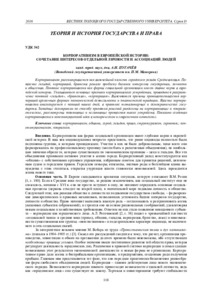Please use this identifier to cite or link to this item:
https://elib.psu.by/handle/123456789/19496Full metadata record
| DC Field | Value | Language |
|---|---|---|
| dc.contributor.author | Пугачев, А. Н. | - |
| dc.date.accessioned | 2017-03-07T06:03:23Z | - |
| dc.date.available | 2017-03-07T06:03:23Z | - |
| dc.date.issued | 2016 | - |
| dc.identifier.citation | Вестник Полоцкого государственного университета. Серия D, Экономические и юридические науки. - 2016. - № 13. – С. 118-128. | ru_RU |
| dc.identifier.issn | 2070-1632 | - |
| dc.identifier.uri | https://elib.psu.by/handle/123456789/19496 | - |
| dc.description | The Corporatism in the European History: Combination of Interests of the Individual and Associations of People A. Pugachev | ru_RU |
| dc.description.abstract | Корпоративизм рассматривается как важнейший элемент городского уклада Средневековья. Появление гильдий, корпораций, братств решало проблему баланса интересов государства, личности и общества. Понятие корпоративизма как формы социальной организации имеет давние корни в европейской истории. Указываются основные признаки корпоративного устройства, проводится разграничение понятий «гильдия», «братство», «корпорация». Выясняются причины противопоставления корпораций архаичным формам экономической деятельности и этатистской традиции. Явление корпоративизма анализируется с позиций наших дней, в практике тоталитарных и демократических государств. Западные демократии по способу принятия решений разделены на корпоративные и плюралистические, рассмотрены позитивные и негативные проявления таких устройств. Показано сходство корпоративизма и конституционной идеи в историческом и современном контексте.=The corporatism is considered as an essential element of city way of the Middle Ages. The emergence of guilds, corporations, fraternities solved the problem of the balance of interests of the state, the individual and society. The concept of corporatism as a form of social organization has deep roots in European history. The main signs of the corporate device are specified. The differentiation of concepts "guild", "brotherhood", "corporation" is carried out. The reasons of opposition of corporations to archaic forms of economic activity and state tradition become clear. The phenomenon of corporatism is analyzed from positions of our days, in practice of the totalitarian and democratic states. The western democracies on a way of decision-making are shared on corporate and pluralistic. The positive and negative manifestations of such devices are considered. Similarity of corporatism and constitutional idea in a historical and modern context is shown. | ru_RU |
| dc.language.iso | ru | ru_RU |
| dc.publisher | Полоцкий государственный университет | ru_RU |
| dc.relation.ispartof | Веснік Полацкага дзяржаўнага ўніверсітэта. Серыя D, Эканамічныя і юрыдычныя навукі | be_BE |
| dc.relation.ispartof | Herald of Polotsk State University. Series D, Economics and law sciences | en_EN |
| dc.relation.ispartof | Вестник Полоцкого государственного университета. Серия D, Экономические и юридические науки | ru_RU |
| dc.relation.ispartofseries | Серия D, Экономические и юридические науки;2016. - № 13 | - |
| dc.rights | open access | ru_RU |
| dc.subject | Государственный рубрикатор НТИ - ВИНИТИ::ОБЩЕСТВЕННЫЕ НАУКИ::Государство и право. Юридические науки | ru_RU |
| dc.subject | корпоративизм | ru_RU |
| dc.subject | конституционализм | ru_RU |
| dc.subject | плюрализм | ru_RU |
| dc.subject | структурализм | ru_RU |
| dc.subject | община | ru_RU |
| dc.subject | corporatism | ru_RU |
| dc.subject | community | ru_RU |
| dc.subject | structuralism | ru_RU |
| dc.subject | constitutionalism | ru_RU |
| dc.subject | pluralism | ru_RU |
| dc.title | Корпоративизм в европейской истории: сочетание интересов отдельной личности и ассоциаций людей | ru_RU |
| dc.type | Article | ru_RU |
| dc.identifier.udc | 342 | - |
| Appears in Collections: | 2016, № 13 | |
Files in This Item:
| File | Description | Size | Format | |
|---|---|---|---|---|
| 118-128.pdf | 258.89 kB | Adobe PDF |  View/Open |
Items in DSpace are protected by copyright, with all rights reserved, unless otherwise indicated.